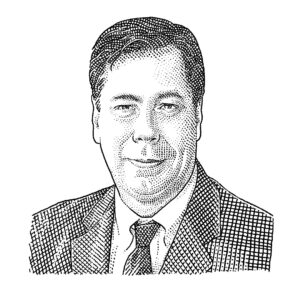With more than three decades of experience in the tech industry, Antonio Marin has successfully navigated roles ranging from software engineering to helming the bold IT initiatives at one of the nation’s leading healthcare companies.
His journey is marked by resilience, hard work, and his servant leadership approach to leadership. Antonio’s story offers invaluable wisdom for anyone aspiring to leadership in the IT industry.
Whether you’re an established IT professional, an aspiring leader, or just curious about the behind-the-scenes workings of a CIO role, this interview is not to be missed!
Walk us through your CIO path. How did you decide to pursue a career in technology, and how did you get to where you are now?
I was studying industrial engineering in college and transferred from a Mexican university to the University of Houston. Back home, there were many engineers but not many computer scientists, so I decided to switch. That was one of the best decisions of my life, in part, because it led to my meeting and marrying my wife. After switching to computer science, I began working at the computer lab at the University of Houston-Downtown. This experience allowed me to solve technology problems people were facing, which laid the foundation for my professional journey. I started working as a software engineer after graduation then moved to a helpdesk at a larger organization, and subsequently moved into project management and various management and executive roles.

Did you always aspire to be a CIO?
Not really, no. My focus was always on the next step in my career, and the rest just unfolded. One of my old bosses jokingly predicted that I’d become a CIO.
Could you tell us about your first role that resembled that of a CIO?
Sure. I worked for a company called Houston Line & Power which later became Reliant Energy. There, I managed the international division. We were acquiring companies worldwide, and I was responsible for developing strategic plans for these new entities. My team grew from just me to 200 people across six countries, and my budget ballooned from zero to $70 million a year in operating costs, all within four years.
How did you manage such rapid growth and responsibility?
It was certainly a challenge. At the same time as managing these acquisitions, I was working on my MBA. It required long hours, but the payoff was immediate. Everything I learned in the MBA program, I applied right away to my role. The experience was very demanding but incredibly rewarding, and I believe it gave me a great advantage in my career.
Can you share some of the projects you’ve been involved in at US Med-Equip and the major accomplishments of your career as a CIO?
On the technical front at USME, I am particularly proud of the rollout of our new enterprise system, GoUSME. This robust system handles customer orders for medical equipment rentals to the delivery and pickup of equipment.
When I joined the company in January 2022, this project was in critical condition after two years of stagnation. I worked with my team around the clock to overcome the challenges and within only 90 days, we had it up and running. We implemented this system ahead of an acquisition.
“As a CIO, you should aim to uplift your team and guide them to constantly better themselves. This requires challenging yourself daily, learning continuously, and fostering empathy.”
Antonio Marin
On July 1, 2022, we acquired competitor Freedom Medical. By August 1, we had integrated the movable medical equipment side of the company into our system, and within 120 days, we had transitioned the massive bed and therapeutic surfaces side onto our GoUSME system. This acquisition doubled the number of employees and locations nationwide, and fully integrating systems in such a short time frame was a huge accomplishment for the entire IT team and the hundreds of others across the company impacted by the changes.
That’s quite an achievement. Could you tell us about how you managed this integration?
We have a culture where we’re always learning and singly focused on improving the experience for our hospital partners and doing whatever it takes. The IT integration effort was a collaboration among every department and employees across the nation. My experience with mergers and acquisitions and my team’s mastery in managing data to support employees in the important work they do every day were also key. We developed a plan to tackle different aspects simultaneously – from employee training on new business processes to data transformation.
Currently, we are applying artificial intelligence companywide to drive innovation in all of our processes to best support our healthcare partners.
What do you think about the current state of IT talent that’s available, and what strategies have you used to employ, recruit, and develop that talent?
As a four-time Top Workplace, we lean heavily on our company’s mission, seeking caring individuals with a passion for helping others, especially healthcare heroes. More employees than at any company I’ve ever seen refer trusted friends for open roles. Since I joined USME in 2022, seven people who I knew have come on board after hearing me talk about work and those who I get to work with every day. We love what we do, and it’s contagious.
Philosophically, our number one hiring tool is the Golden Rule, and our culture is truly empowering. In fact, our CEO’s title isn’t Chief Executive Officer, but Chief Empowerment Officer. His philosophy is to equip us with the necessary tools and the freedom to succeed, which we then extend to our team members. We prioritize caring individuals who either have the skills to get the job done or the potential to acquire them.
What advice would you give someone aspiring to be a CIO, based on your experiences and your background?
Understand the business you’re in and learn to talk the business language, not just technology. When you’re in meetings with the C-suite or employees, they need to understand your vision for how technology can drive business outcomes and help them do their job.
Secondly, follow your passion. As a CIO, aim to uplift your team and guide them to constantly better themselves. This requires challenging yourself daily, learning continuously, and fostering empathy.
Is an MBA something you would recommend to anyone who wants to become a CIO, or do you think they can take it or leave it as long as they know how to speak business?
The necessity of an MBA varies from person to person. In my case, it was crucial because I had to evaluate companies from the technology side due to mergers and acquisitions. Education is the one investment with guaranteed returns, whether that’s an MBA, Ph.D., or self-driven learning.
Sometimes, certain levels of education can be prerequisites for specific roles within companies, which could place you ahead of other candidates. But ultimately, it’s a personal choice. My advice would be to always invest in yourself, and if that means pursuing an MBA or Ph.D., then go for it.
Who would you say has been the biggest influence on your career path, either in school, or in a previous role? And why?
There have been numerous influential figures throughout my journey. My parents instilled in me a strong work ethic; my father was hard-working, and my mother, a woman of strong character, taught me to confront and navigate challenges head-on. My wife and children, especially my son, who was born premature but fought hard to survive, have been my sources of inspiration.
Professionally, I’ve had both negative and positive influences. My first boss was, unfortunately, not a good leader, showing no respect or support for his employees. Yet, from that negative experience, I learned what not to do as a leader. Conversely, my next boss was a great coach and mentor, whose approach to servant leadership continues to guide me today.
How do you decompress from the challenges of a CIO? What do you like to do for fun?
I love movies, history, and traveling. Cooking classes and going to the movies with my wife are also fun pastimes. However, the challenges of being a CIO don’t pressure me too much because I see my work as my passion—it’s like a game challenge. I also derive a lot of joy and satisfaction from my team’s success and accomplishments.
Are there any books that you recommend, books that you’ve given to others or have shaped you as a CIO?
One book I often revisit, especially when transitioning jobs, is “You’re in Charge, Now What?” It chronicles the journeys of different CEOs as they join new organizations and construct their 100-day plans. It helps ground me, reminds me that my past success strategies may not apply to a new role, and underscores the importance of adapting to a new organization’s culture.
Another recent favorite is “Goliath’s Revenge“, which discusses how large companies innovate and defend themselves against startups. It covers not only technology but also business strategies essential for organizational survival.
Beyond professional books, I find profound leadership lessons in the Bible. It helps me put things into perspective, and I often refer to it during my travels or quiet moments.
Do you have any final words you’d like to share?
Thank you for this opportunity, it’s been a dream of mine to be interviewed for The National CIO Review.
For anyone aspiring to become a CIO, follow your passion and do it for the right reasons. Always remember your roots and the people who’ve been there on your journey. Networking is a long-term process, and these relationships can come to your rescue in various ways, as well as give you opportunities to help others.
Remember, authenticity is key, and people can tell when you’re not being true to yourself.








